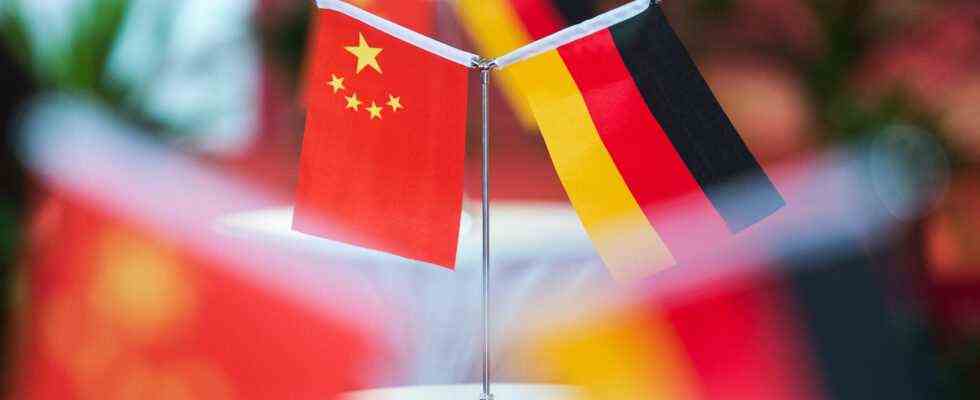Status: 13.12.2021 11:13 a.m.
The German relationship with China could be marked by much more critical tones under the new federal government than in the Merkel era. This is already evident in the first statements made by the new Foreign Minister Baerbock.
In October, China’s head of state Xi Jinping said goodbye to Angela Merkel. An excerpt from the video call was shown in Chinese media, accompanied by music. Xi Jinping showered the CDU politician with praise and called her an “old friend”. An honor from the Chinese point of view that only a few heads of state and government are bestowed.
Angela Merkel earned this honor during her years as Chancellor, pursued business-friendly policies and seldom openly criticized the communist leadership. It is true that she always met dissidents on her visits. The government forgave her for that, however, as her basic line was friendly towards China.
China wants pragmatism
A press conference by the Foreign Ministry on Thursday in the Chinese capital – one day after the new federal government took office: The spokesman for the state and party leadership, Wang Wenbin, says he would like cooperation and he hopes Germany will continue to pursue pragmatic China policy.
That means: politics as before under Angela Merkel. But already in the coalition agreement there are points on which China always warns other countries not to interfere: the suppression of the Uyghurs in Xinjiang, human rights, Hong Kong and Taiwan, a free Indo-Pacific region.
Wishes cooperation and pragmatism: the spokesman for the state and party leadership, Wang Wenbin.
Image: picture alliance / dpa / kyodo
“Volume will increase”
Jörg Wuttke, President of the European Chamber of Commerce in China, says: “The new government has a mandate from the people and 75 percent of them think negatively about China. That will also be reflected in politics.” There will be a stronger focus on “so-called human rights, on values,” added Wuttke. That’s why you have to be prepared for the fact that the volume will increase. One can only hope “that reason will rule on both sides, not to let this become a crescendo.”
Most observers assume that the sound will get rougher. But there is still no clear line in the new federal government’s China policy. While Chancellor Olaf Scholz of the SPD is still largely keeping a low profile when it comes to China, others have already rushed ahead.
Politicians from the Greens and the FDP are particularly critical of China. Wuttke thinks that the new federal government must first be given time to find its line. “First they have to see where China is and deal with all the issues,” he says. “China will certainly be right at the top of the agenda when it comes to foreign policy issues – especially since the Olympics are around the corner and, of course, politically it is relatively hot.”
Baerbock does not rule out an Olympic boycott
Here, too, China is reacting sensitively. Several countries have already announced that they will politically boycott the Olympic Games in February. Including the USA, Australia, Great Britain and the EU country Lithuania. They send athletes to China, but politicians stay at home. A symbolic act, because traveling to China is currently extremely complicated – because of the People’s Republic’s strict zero-covid policy.
If Germany, China’s most important trading partner in Europe, were to boycott the Games, it would be a radical change of course in German China policy. Foreign Minister Annalena Baerbock at least does not want to rule out a boycott. She wants to coordinate with the other countries at the EU foreign ministers’ meeting in Brussels today, said the Green politician on ZDF.
China is also a partner for us as Europeans, for the G7. When it comes to many global issues, things can only be solved together. But China is also a competitor and, in some ways, a system rival. That is why the dilemma is sometimes to cooperate together on a foreign policy, and cooperation is the top priority of diplomacy and international cooperation. But that is the attitude of liberal democracies, always to do so on the basis of human rights and international treaties.
Hope for China’s leniency
It is unlikely that the EU states will find a common European line when it comes to the Olympic Winter Games. While Lithuania is boycotting, French President Emmanuel Macron has already made it clear that this is out of the question for him.
Wuttke hopes that the Chinese state and party leadership will deal mildly with the new federal government in the coming months. “I do believe that China would be well advised to give the federal government enough time and space at the beginning to allow so-called mistakes to be made under certain circumstances.”
Old friends? What about the German-Chinese relationship
Benjamin Eyssel, ARD Beijing, December 13th, 2021 10:16 am

